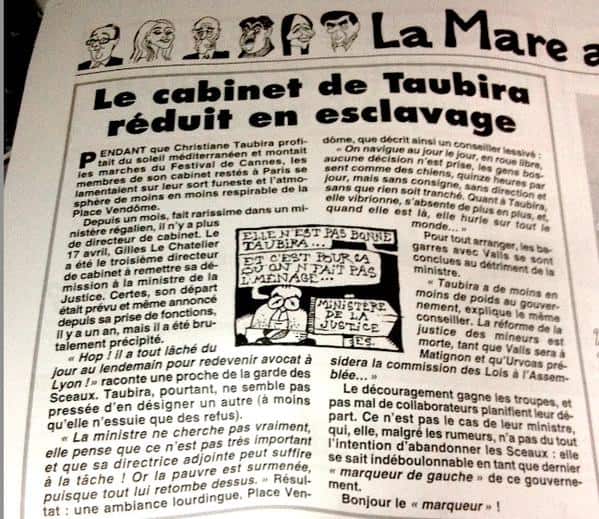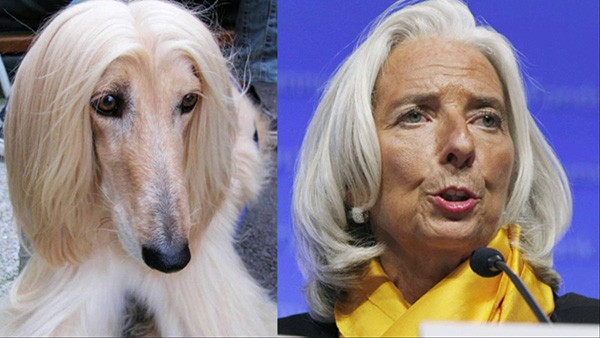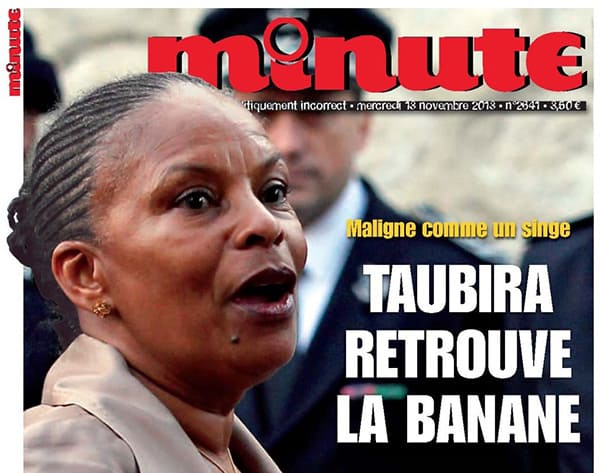The Black Woman Who Would Be President of France
- Post AuthorBy Timothy Vorgenss
- Post DateWed Mar 02 2022
“The people who look like me are more numerous [than white people]. And it is better not to challenge that world too much.”
Thus spake Christiane Taubira, a French cabinet minister, on May 6, 2015. These threatening words are from a black woman who wants to be the next president of France. Miss Taubira served as minister of justice under Socialist president François Hollande from 2012 until 2016, and has helped many French people learn what blacks think of them.
The “French Kamala Harris” was born in Guyana, a small French territory on the shoulder of South America, just above Brazil. She was one of 11 siblings raised by a single mother. Now 70 years old, her first elected office was in 1993, as a member of the French National Assembly, representing Guyana. In Guyana, she founded and was president of the Walwari Party, but in French politics she has been affiliated with the Left Radical Party and the Socialists.
In 2016, Miss Taubira resigned from her highest-ever post of justice minister because she thought President Hollande was too harsh. After the spectacular, coordinated attacks of 2015, in which terrorists killed 137 people, he proposed to strip French citizenship from dual nationals convicted of terrorism.
Miss Taubira’s high point in politics was her vociferous promotion of France’s 2013 law that legalized same-sex marriage. She is divorced — from a man — who was the leader of Guyana independence movement and who went to prison for plotting to blow up petroleum facilities. The couple had four children — Lamine, Nolywé, Diawara, and Djamila — whom she rarely sees.
Miss Taubira manages to be both an ethnic chauvinist and a universalist. In 2007, she complained about The Great Replacement in Guyana: “We are at an identity turning point. Ethnic Guyanese have become a minority in their own land.” However, she promotes non-white immigration into France.
In Guyana, Miss Taubira’s Walwari party promotes a Charter of Social Citizenship that pushes the interests of Guyanese “in all sectors of activity,” though she has fought all her political career to deprive the French of any kind of national preference. She has never feared media scrutiny of this double standard. French journalists share her view that the lands of non-whites are private property, while the lands of whites belong to everyone
Miss Taubira seems to understand the biological reality of race. In 2020, she complained about blood banks in Guyana: “It’s been more than 15 years since the French blood establishment moved, no blood bank on site, all the blood comes from elsewhere with its genetic capital.”
On a visit to New York City in December 2020, Miss Taubira praised Kamala Harris: “There is no one to symbolize hope better than she.”
Miss Taubira promoted a law, passed in 2001, officially to recognize African and Amerindian slavery as crimes against humanity. Later, she wrote how she felt when white legislators opposed the bill: “I felt the vibrations of my murderous instincts . . . . I could see myself ripping out their villainous tongues, defenestrating them, flaying them alive . . . .”
Needless to say, her bill ignored the enslavement of whites and blacks by Arab Muslims and the long history of blacks enslaving each other. She even declared in 2006, “We must not evoke too much the Arab-Muslim slave trade, so that young Arabs do not carry on their backs the weight of the heritage of the misdeeds of the Arabs.”
Miss Taubira wants to open a discussion on reparations for slavery. “No material reparations can ever erase a crime as great as slavery or colonialism,” she has said, but asks, “What sense does it make to live together and act as if the past has left no trace? We must have courage and rise above present preoccupations. . . . Let us take up the question of reparations and the fear and hysteria should disappear.”
In March 2005, the French historian Olivier Pétré-Grenouilleau, wrote that, historically, the slave trade was mainly practiced by blacks themselves and by Arab Muslims. A “French” collective of non-whites filed a complaint. Miss Taubira, minister of justice at the time, knew that Mr. Grenouilleau was right but still complained, “It’s a real problem that a university professor, paid by the National Education with public funds, can teach such ideas to his students.”
Eric Zemmour is also running in the presidential elections. When he was still a journalist, he noted that as minister of justice, she had released a great many prisoners, writing, “Mama Taubira watches over her children who have made big trouble.” That was no doubt because, as anyone who has visited a French prison knows, the overwhelming majority of inmates are non-white. The crime wave she unleashed was so bad that China decided to send agents to protect Chinese tourists visiting Paris.
In 2013, as minister of justice, she was on a current events show in which a white mother talked about her teenage daughter who was robbed, beaten into a coma, and left for dead by a 26-year-old black man. The woman pointed out that he had been arrested 50 times, starting at age 15, for drug-taking and crimes of violence, and had been convicted 12 times. Forty minutes after attacking her daughter, he raped and beat another white girl. He could do this because, despite his many convictions, he was in “semi-liberty,” meaning he spent nights in jail but was let out during the day. He was not incarcerated despite driving drunk during his “semi-liberty,” and sometimes staying out all night on weekends. The woman was outraged that this was possible and wanted to know what the justice minister thought. Miss Taubira coldly acknowledged her suffering but showed little concern, noting only that “errors may have been made.”
Miss Taubira appears to be a harsh taskmistress. Several of her chiefs of staff (she went through four in three years when she was a minister), found her aggressive, demanding, and disorganized. A 2015 article about her management skills in Le Canard Enchaîné had the headline, “Taubira’s Staff Reduced to Slavery.”
In 2004, a white woman on her staff, Sylvia Edom, sued Miss Taubira for unlawful termination and won damages of 5,300 euros. She said her boss had “professional inadequacies” and that her haughty treatment amounted to “moral harassment.” Miss Taubira pronounced herself “astonished by the fuss made over this ordinary affair.”
In 2015, one of her former employees described her office: “Every chair was occupied by piles of unprocessed files, no one understood anything about its organization, everything was managed from day to day.”
French lefties admire her use of language. She loves convoluted phrases that pass for oratory, such as: “It is urgent to finally embrace our inner multiplicity that unifies us in our dissimilarity.” “I take hold of my destiny, and, in a surge of life I decide, with this strength, with this determination, with this sovereignty that makes Man a political creature.” White leftists think Victor Hugo has returned from the dead.
Miss Taubira can’t take a joke. In 2013, a National Front candidate named Anne-Sophie Leclère said of her, “I would rather see her up a tree than in the administration.” Miss Leclère also posted on Facebook a photo of a little monkey labeled “at 18 months” next to a photo of Miss Taubira, labeled “today.” Miss Taubira had her Walwari Party bring hate-crime charges against Miss Leclère in Guyana, where she was sentenced to nine months in prison and five years of political ineligibility. The entire procedure was overturned as illegitimate, but the Paris criminal court found Miss Leclère guilty of “public insult” and gave her a suspended sentence of 3,000 euros.
At the time of the Leclère fracas, Nicolas Domenach was hosting a talk show with Éric Zemmour. He was outraged: “It is not her politics that is attacked, but her humanity when she is animalized in this way!” A few weeks later, when the white woman Christine Lagarde was appointed head of the International Monetary Fund, Mr. Domenach said on television, “She has something different since she became head of the IMF. . . . Look, this is her new hairstyle.” He showed a photo of her alongside one of an Afghan hound, saying “Here is something that looks like her.”
When the conservative weekly, Minute, ran a cover with the caption, “Clever as a monkey, Taubira finds the banana” (the French expression avoir la banane or “have the banana” means to be happy), Miss Taubira considered bringing suit but decided not to because she said the attention would increase the weekly’s sales.
Colorful as a Taubira presidency would be, we are unlikely to see one. She already made one run for the Elysee Palace. In 2002, she failed to qualify for the second round, winning only 2.32 percent in the first round of voting.
For the Left, this year’s campaign has been an especially demoralizing, with a gaggle of greens and progressives fighting over a dwindling share of the electorate. In January, Miss Taubira officially announced her candidacy, with the lofty goal of uniting the squabblers behind her. The other candidates saw her as an upstart.
Miss Taubira cobbled together a “people’s primary” that was supposed to choose a final leader from among no fewer than seven lefty candidates. She promised to withdraw in favor of the winner, but none of the other prominent candidates — Socialist, hard left, Green — did. Her subsequent victory was therefore meaningless.
This very day, Miss Taubira announced that she would withdraw from the race. She could not meet the distinctly French requirement for an official run for the presidency: endorsements from at least 500 mayors. So far, she has collected some 128. France will therefore have to wait a little longer for a president who takes office urging reparations for slavery, an ethnostate for her own people, and open borders for France.
Correction: An earlier version of this article mistakenly wrote that Miss Taubira served under President François Mitterrand. She served under François Hollande.
- Post TagsBlacks in Charge, Elections, Europe, France, Reparations


